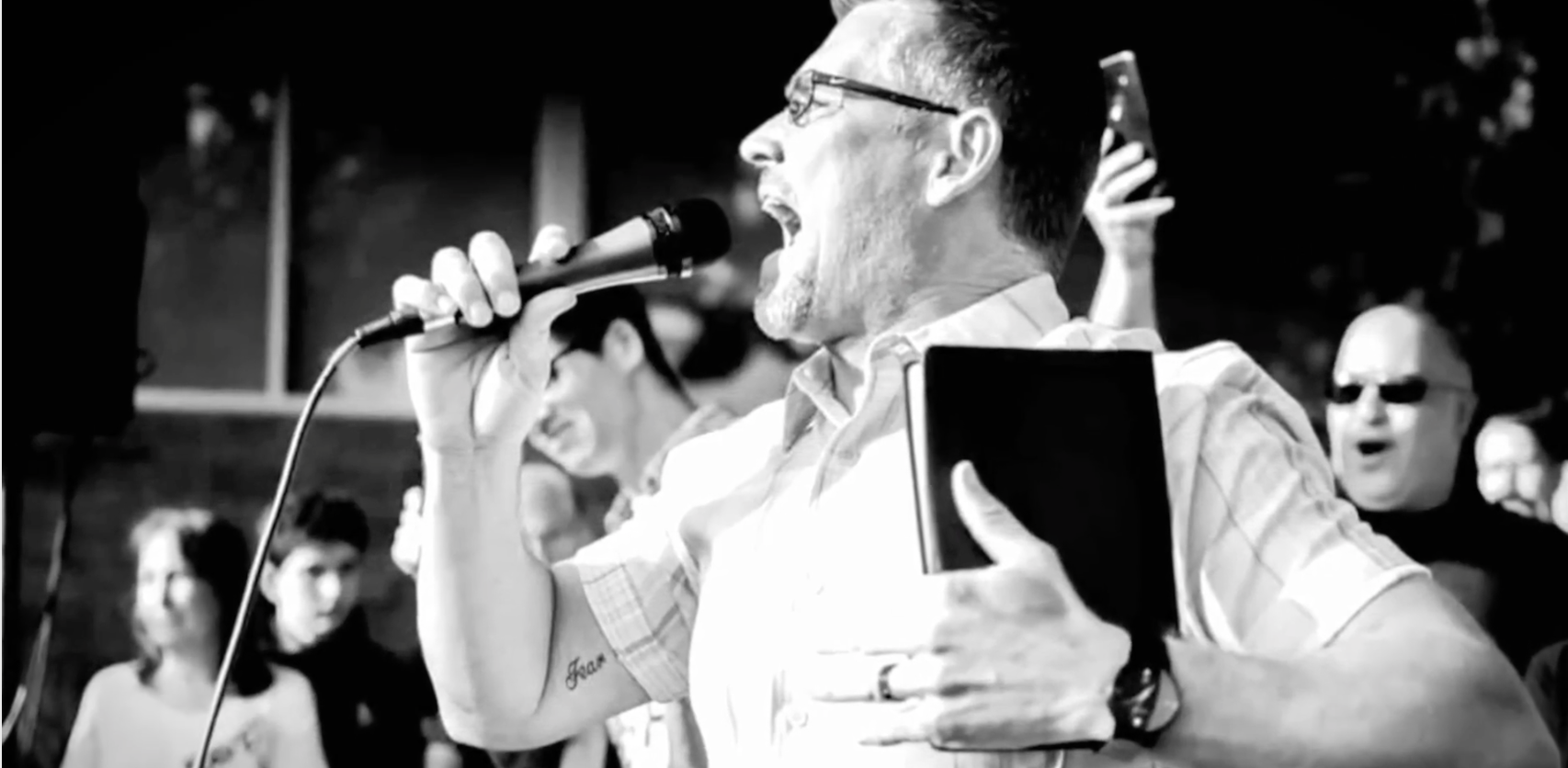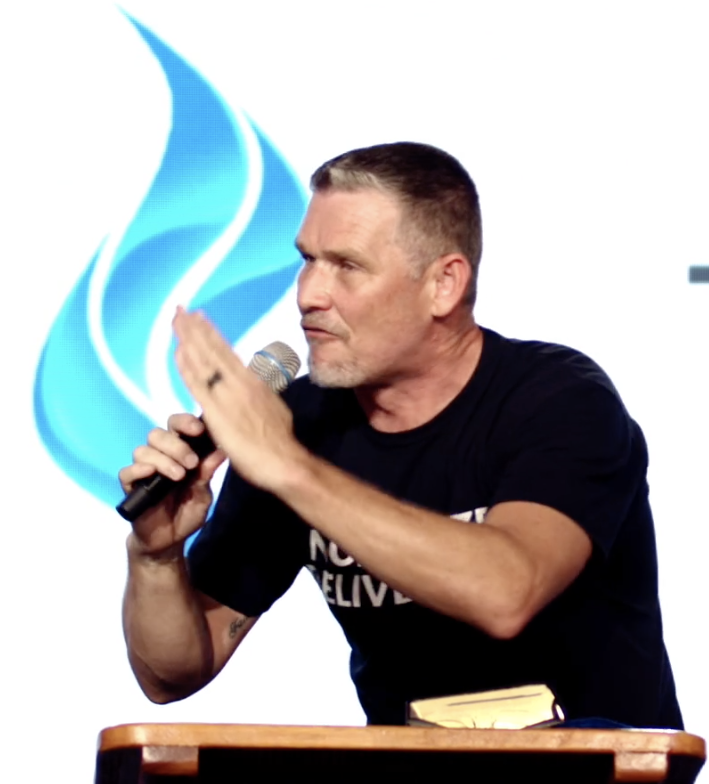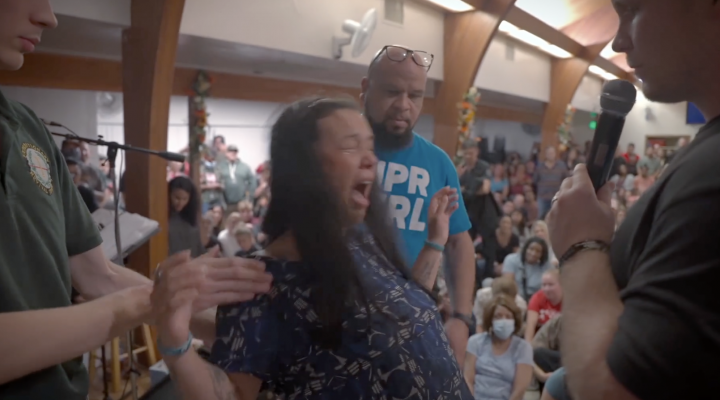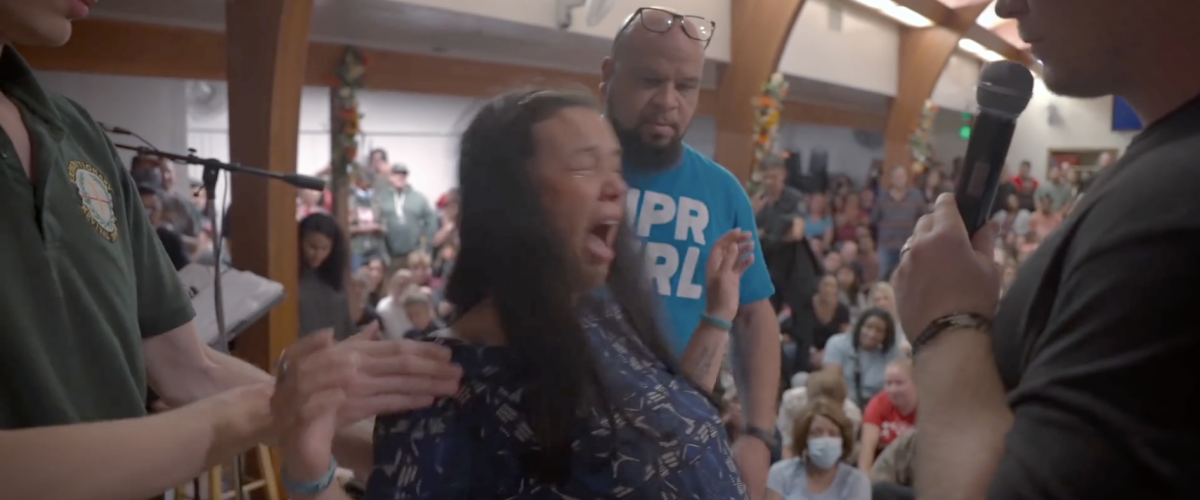Nashville pastor Greg Locke gained national notoriety for his rebellion against COVID precautions, his denial of the pandemic itself and his enthusiastic support for Donald Trump.
Now he’s found new life as a demon slayer.
“It was never about the controversy. It was never about the politics. I thought it was. I thought it was about Trump. I thought it was about COVID. But God built our platform for deliverance,” Locke says in his new self-produced documentary, Come Out in Jesus’ Name.
The film, released March 13, portrays Locke’s new partnership with “a diverse group of demon-slaying preachers as they began to spark one of the greatest awakenings in the history of the Christian church.”
That “awakening” is not the Asbury revival or any movement most Americans have heard of. It is, instead, something living in the subculture of the New Apostolic Reformation, a fringe movement linked to the kind of Christian nationalism Locke knows so well.
This is the world of demons and evil spirits and exorcisms and signs and wonders.

Demon slaying through baptism
Locke says he began his career as a demon slayer during a baptism service one Sunday. As people were cycling through to be immersed in Global Vision Bible Church’s horse trough baptistry, Locke noticed a young girl in the water with her grandmother holding her from behind.
“I put the grandmother down into the water. And as I was putting the grandmother into the water, there was no problem,” Locke recalls. “But that young girl, that 8- or 9-year-old kid, put her hands and her fingers and her claws up in our face and she began to hit us and growl.”
“That young girl, that 8- or 9-year-old kid, put her hands and her fingers and her claws up in our face and she began to hit us and growl.”
Rather than wondering if the girl might simply be afraid of being pulled under water from behind while an entire congregation cheered, Locke assumed she was being controlled by a demon, characterized her as growling with claws, and became afraid himself.
“I was afraid of her, of an 8- or 9-year-old girl with a demon in her,” he remembers. But despite his fear of the little girl, he quickly moved on, noting, “We get them out of the baptistry, they walk away, and I’m going right to the next one.”
Locke identifies this moment as the catalyst for accepting his apostolic power.
“When the girl flared up in the baptistry, my very first reaction is to deny that that happened,” he explains. “But the fact that it did happen brought me to this moment … . Because if that never would’ve transpired, I never would’ve understood, ‘You know what? I really do have power. I really do have authority that’s been given me by Jesus. And shame on me that I have let the Pharisees in my life and the denominational hierarchy tell me that I have no power and no authority when Jesus clearly gave me power and authority over unclean spirits.’”
Afraid of being a ‘charismaniac’
Locke hasn’t always believed in or practiced supernatural gifts of the Spirit, he explains. “I looked at the Bible through the lens of being a Baptist. And I mean capital B-A-P-T-I-S-T.”
Referring to the belief that miraculous spiritual gifts ceased after the death of the first century apostles, Locke said, “I was a cessationist amongst all cessationists. I believed every gift ceased.”
Later, Locke began to change his mind about the continuation of supernatural gifts based on his reading of the Bible and on his experiences on overseas mission trips, he says. “One day I began to read the book of Acts that there was a lot of people that did apostolic things that weren’t apostles. And I thought to myself, ‘Have I been lied to? Have I been duped? Have I been deceived?”
“While he believed in witchcraft and magic, he feared being labeled a ‘charismaniac.’”
On mission trips, he noticed how often people spoke in tongues and behaved in ways he previously believed to be manifesting demons. While he believed in witchcraft and magic, he feared being labeled a “charismaniac.”
Eventually, his reading of the Bible and his experience on mission trips overcame this fear.
“When I took off the denominational lens, and I said, ‘Holy Spirit, you’re the greatest teacher in the universe, teach me the word of God without man’s approval, show me what the Bible really says.’ And when I did that, the things I saw in Africa and other nations began to make sense. And it’s two kingdoms colliding. And it’s happening right now before our very eyes.”

Building greater power through networking
Locke ventured away from his roots as an independent fundamentalist Baptist preacher and entered the world of the supernatural. He began networking with other male pastors and prophets, featured in the documentary, who may not be household names but who have connections and influence with the New Apostolic Reformation.
For example, Derek Prince has been a charismatic teacher since 1971 and is connected with the Latter Rain Movement. Isaiah Saldivar is connected with Cindy Jacobs and Dutch Sheets, two influential figures in awakening the rage that led to the January 6 insurrection at the U.S. Capitol.
Charismatic apostles and prophets cooperate in a loosely affiliated yet highly networked circle of independent preachers and ministries, according to Matthew Taylor in the “Charismatic Revival Fury” series on the Straight White American Jesus Podcast.
While Locke wanted to break into their group, the charismatic demon slayers also wanted access to Locke’s platform.
Locke’s outlandish attacks on Anthony Fauci, LGBTQ people, the media and Democrats brought him 4.6 million followers across his social media platforms, he says, claiming this is proof of God honoring his ministry: “Anything controversial that I’d get involved in, God would honor it.”
“Controversy? I’ll be honest. Controversy built our platform.”
“God used controversy. He used hate from the world. He used CNN. He used the media. He used all of it,” Locke says. “He used political fighting if you will. He used all of that to grow a massive sized platform. Controversy? I’ll be honest. Controversy built our platform.”
That got the attention of some of the charismatic prophets, including Alexander Pagani.
“What I don’t want to happen is that we miss a sovereign move of God,” Pagani says of including Locke in the movement. “If God is going to use him and Global Vision to be the catalyst to help thrust what we have already been doing, and we went as far as we can go, I want to come alongside that.”
Further, Pagani says, he realized Locke “has a reach that we don’t have.”
But it was the blessing of Isaiah Saldivar, founder of The Deliverance Network, that sealed Locke’s admission to the demon-slaying club.
“Although he may be the youngest as it were of that group, he’s also very influential in that group,” Locke explains. “And the men began to say, ‘OK, Isaiah’s on board.”
Locke remembers the time Saldivar got up to preach. “And when he said those unbelievably beautiful things about our ministry and about our church, I was like, ‘One of the apostles of deliverance just apostled me in front of the entire world!”
The admiration was mutual.
 Locke describes a moment when Pagani was preaching at Locke’s church: “All of the sudden my wife stopped an actual deliverance that she was doing. She was praying over someone. She turns around, sits down, and like a school child, just absolutely focuses her undivided attention on brother Pagani and what was happening. And she was mesmerized. And to see her watch him was fascinating for me. It was a beautiful moment. It was a full circle moment of a man that brought so much help to us without even knowing it. And now the man that wrote the book that helped us get started is now standing on the platform doing it before our very eyes.”
Locke describes a moment when Pagani was preaching at Locke’s church: “All of the sudden my wife stopped an actual deliverance that she was doing. She was praying over someone. She turns around, sits down, and like a school child, just absolutely focuses her undivided attention on brother Pagani and what was happening. And she was mesmerized. And to see her watch him was fascinating for me. It was a beautiful moment. It was a full circle moment of a man that brought so much help to us without even knowing it. And now the man that wrote the book that helped us get started is now standing on the platform doing it before our very eyes.”
Mental health problems or unclean spirits?
One of the most common criticisms of the charismatic movement is that its leaders may mistake mental illness for unclean spirits.
Locke talks about unclean spirits without differentiation. Having read a book called The Diary of an Exorcist by Win Worley, Locke began conducting Sunday night deliverance services.
In one example included in the documentary, a woman is shown talking about her physical ailments and nightmares. The woman prays, “I renounce the evil thoughts that I see my children murdered in their beds when I go into their rooms. I renounce.” Then in a weak trembling voice, she cries, “It’s just a dream that I have and — what’s behind the door?”
The demon slayer staff member affiliated with Locke asks her, “Is that what you keep hearing?” Then he prays: “Alright, we come against every unclean spirit there in Jesus’ name. We bind right now every unclean spirit of infirmity, every spirit of witchcraft and confusion. Satan, we know you’re there and we break your power. You have no legal right over her in Jesus’ name.”
“When the woman begins flapping her arms, the man declares she has an ancestral tribal spirit bird from Puerto Rico on her.”
When the woman begins flapping her arms, the man declares she has an ancestral tribal spirit bird from Puerto Rico on her. Then as she screams and flails and vomits, he commands, “Get off of her now. Go in Jesus’ name.”
After what he says lasted several hours, he claims victory: “What she needed wasn’t healing, it was deliverance.”
Locke himself dismisses the possibility of mental illness in such stories: “People come to me all the time, ‘Pastor Locke, I got voices in my head. What do you think it is?’ Oh, I don’t think. I know what it is. You ain’t got no imaginary friend. You got a demon.”
Outsourcing sexual abuse
Because Come Out in Jesus’ Name is so fascinated with power, one of its biggest problems is the way it handles abuse.
When talking about sexual temptation, Locke and the other men featured with him continually place the source of the problem outside of the individual. They declare: “Something is enticing my lust. Something is manipulating my flesh. Something is controlling my mind. Something is making me go there, say that, think that, look at that. I’ve crucified the flesh, I’ve reckoned myself dead. And yet, I still struggle with this, I still feel enticed. That’s demonic. That’s oppression from the enemy.”
They encourage abusers not to take responsibility for their own actions.
Locke says: “If they are unwilling to forgive,” those who are sexually abused have a “signed contract” with a demon and that the “demons will not cross the barrier of a person’s bitterness.”
The message of the documentary is that sexual abusers are allowed to put the blame for their actions elsewhere, while those they abuse have to let them off the hook in order to rid themselves of their signed contract with a demon.

Crucifying the flesh
Come Out in Jesus’ Name says while “crucifying the flesh” is necessary for Christians, it isn’t enough because there is “some kind of a living, rotten thing that wants to eat. And every single three weeks, it needs to be fed.”
The particular cravings mentioned are over-eating, under-eating, anxiety, fear, depression, watching movies like Twilight and Harry Potter, watching Disney movies, playing with trolls, attending drag shows, going to yoga classes, practicing “self-pleasure,” and having dreams about sex.
All these are problems caused by demons and must be exorcised away from the bodies of Christians, even those who are crucifying their flesh, the film teaches.
While some of these teachings deny medical science and basic biology, they also cause followers to become disembodied. Most humans need sexual release — whether through sex, masturbation or even involuntary dreams. These are not caused by demons. These are caused by being human.
Labeling legitimate bodily desires for pleasure as “craving” and “rotten” fuels a disconnection from our bodies, just as blaming a woman’s dreams about murdering her children on a demon dismisses her very real mental health concerns.
Incarnation humanizes God. Thus, to hold theologies that dehumanize people is to dehumanize God.
Locke and his counterparts emphasize the supernatural over the human, however.
“Everything we know about God is supernatural,” says Vladimir Savchuk. “Everything we know about our Savior is supernatural. Virgin birth is supernatural. Him walking on water is supernatural. Him saying, ‘Eat my flesh and drink my blood’ is supernatural. What attracted people to his ministry was signs and wonders and miracles. To take that away would be to take away our faith.”
What remains
The metamorphosis of Greg Locke from angry fundamentalist preacher to charismatic apostle may appear to be a departure from his role in fueling conspiracy theories and right-wing rage leading up to the January 6 insurrection.
And indeed, he attempts to some degree to distance himself from his past.
But the political messages are still present in the film through references to COVID conspiracies, LGBTQ people, Planned Parenthood, conversations with the pastor of Patriot Church, drag shows, and complaints that kindergartners are being taught about sex at school.
And those conservative favorites are used as a call to action.
In publicity, the makers of Come Out in Jesus’ Name declare: “The kingdom of God is not about talk. It’s about power and demonstration.”
Mike Signorelli explains: “In the megachurch, it was thousands of people to go see one person facing inward. This next era is there’s still circles around one leader, but they’re all facing outward. And then that leader is a general commanding armies.”
Locke is one of those generals, having amassed millions of followers and now networking with charismatic demon slayers to wield power over the world. Locke may have left his Baptist roots to become what he calls a “charismaniac.” But he’s still advancing the same dominion theology that he’s been wielding over people all along.
Rick Pidcock is a 2004 graduate of Bob Jones University, with a bachelor of arts degree in Bible. He’s a freelance writer based in South Carolina and a former Clemons Fellow with BNG. He recently completed a master of arts degree in worship from Northern Seminary. He is a stay-at-home father of five children and produces music under the artist name Provoke Wonder. Follow his blog at www.rickpidcock.com.
Related articles:
Pastor Greg Locke is all over the internet spreading conspiracies; here’s why you shouldn’t believe him | Analysis by Rick Pidcock
Shame on you, Pastor Greg Locke, for saying autism is demon possession | Opinion by Lydia Joy Launderville
The need to be persecuted | Opinion by Mark Wingfield


